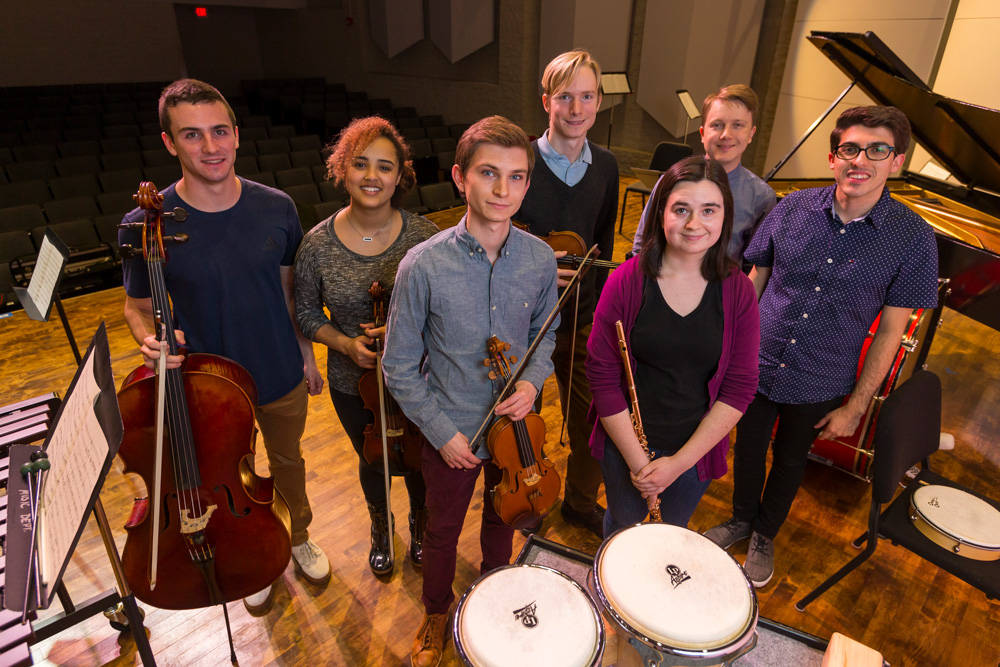With high, amplifying ceilings, Burke Hall’s rehearsal space transforms the music of just six musicians into a symphony of sound. Playing instruments from flute to cello, these students, who cross a range of class years and majors, combine their talents as the New Music Ensemble.
“The group focuses on the study and performance of modern and contemporary music ranging from the mid-20th century to the present,” said Chris Westover, assistant professor of music. “Students should be engaged in the performance of the music of their own time. It allows them to experience creating music in a unique way, because with this music we can still connect with the creators of the music. This deepens their experience in a special way.”
The group has had the benefit of some professional advice from visiting ensemble Eighth Blackbird.
“What we do is new concert music from a classical tradition,” said members of Eighth Blackbird. “A lot of what we’re playing is music written for us, mostly within the last five years. So many people are coming from so many influences not just classical, but also jazz or rock.”
Eighth Blackbird drew on this knowledge and experience of new classical music, to deepen understanding of “Terry Riley’s In C,” through an emphasis on innovation and improvisation.
“I want you guys to all be composers in the moment. Each time you perform this, it’s going to be a new piece.”
“The opportunities to work with incredible professional ensembles (including ETHEL) is one of the things that makes Denison a really excellent place for young composers.”
Eighth Blackbird asked the students to leave their stands and sheet music behind, and instead, walk around or change positions while playing. They talked about the importance of stepping back, listening to each other, and changing the piece in the moment as a reaction to those around them.
“As much as the piece is written on paper, we create a new version of it every time we play, due to the loose structure of the piece — something I haven’t gotten in other ensembles I’ve been part of,” said Lashonda Love ’18. “Eighth Blackbird had great advice on how to think more outside of the box for ‘In C,’ which has definitely invited more play and exploration into our group rehearsals.”
“Since the sheet music serves as a guide for the performer rather than a comprehensive dictation of the composer’s intent, I’m learning to engage this opportunity of artistic freedom and take new musical risks,” added Max Meirow ’18. “Eighth Blackbird offered suggestions that we’re excited to try out over the next few rehearsals.”
Although these students don’t necessarily intend to be composers themselves, they believe their time with Eighth Blackbird was influential in understanding the compositional side of music.
“Compositionally, working with Eighth Blackbird has been incredibly enlightening, because they’re all extremely enthusiastic about the great variety of new music and encouraged me to expand my boundaries as far as possible, both in terms of listening and conducting,” said Clem Pearson ’20.
During their time on campus, Eighth Blackbird also visited a music composition class, where students had the opportunity to hear their work played by the group. In an Organizational Psychology class, they shared insight into business strategy and aspects of their business model.
“Being able to learn from an ensemble like Eighth Blackbird is an opportunity that undergraduate music students don’t often get,” said Pearson, “The opportunities to work with incredible professional ensembles (including ETHEL) is one of the things that makes Denison a really excellent place for young composers.”






